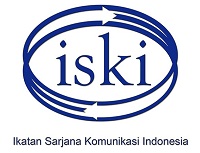Changes in Organic Composition of Capital Behind Pikiran Rakyat Strategy of Convergence
Abstract
Keywords
Full Text:
PDFReferences
Adzkia, A. R. S. (2015). Praktik Multimedia dalam Jurnalisme Online di Indonesia. Jurnal Komunikasi, 10(1). Retrieved from https://journal.uii.ac.id/jurnal-komunikasi/article/view/7489
Dickinson, R. D. (2015). Inside the changing newsroom : journalists ’ responses to media convergence Kostas Saltzis and Roger Dickinson, (May 2008). https://doi.org/10.1108/00012530810879097
Feldman, T. (1997). An Introduction to Digital Media. London: Routledge.
Jenkins, H. (2006). Convergence Culture: where old and new media collide. New York University Press.
Mulyanto, D. (2010). Kapitalisme: Perspektif Sosio-Historis. Bandung: Ultimus.
Lugmayr, A. (2016). Media Convergence Handbook - (Vol. 1). Springer-Verlag Berlin Heidelberg.
Marx, K. (1887). Capital, Volume 1. Moscow: Progress Publisher.
McPhillips, S., & Merlo, O. (2008). Media Convergence and the Evolving Media Business Model: an overview and strategic opportunities. The Marketing Review, (August). https://doi.org/10.1362/146934708X337663
Nikunen, K. (2014). Losing My Profession : Age , Experience and Expertise in the Changing Newsrooms, (November 2013). https://doi.org/10.1177/1464884913508610
Pikiran Rakyat. (2019). Sejarah Singkat Pikiran Rakyat Digital. < https://www.pikiran-rakyat.com/page/tentang-kami >
Pratopo, W. M. (2018). Komodifikasi Wartawan di Era Konvergensi: Studi Kasus Tempo. Jurnal Komunikasi Indonesia, 6(2), 129–138. https://doi.org/10.7454/jki.v6i2.8715
Resmadi, I. (2014). Kajian Difusi Inovasi Konvergensi Media di Harian Pikiran Rakyat. Jurnal Sosioteknologi, 13.
Schramm, W. (1971). Notes on case studies of instructional media projects. Working paper for the Academy for Educational Development, Washington, DC.
Tapsell, R. (2015). Platform convergence in Indonesia : Challenges and opportunities for media freedom, 21(2), 182–197. https://doi.org/10.1177/1354856514531527
Tapsell, R. (2017). Media Power in Indonesia, Oligarchs, Citizens and the Digital Revolution. London: Rowman & Littlefield.
Nurulliah, N. (2019). Hut Ke-53Pikiran Rakyat Sinergi Bersama untuk Pertahankan Posisi Platform Efektif. < https://www.pikiran-rakyat.com/bandung-raya/2019/03/25/hut-ke-53-pikiran-rakyat-sinergi-bersama-untuk-pertahankan-posisi-platform-efektif>
Yin, R. K. (2003). Case Study Research: design and method (3rd ed). California: Sage Publications.
Yin, R. K. (2015). Case Study Research and Application, design and method (6th ed). California: Sage Publications.
Yuganto, S. P. (2015). Masa Depan Jurnalis di Era Konvergensi Media.
DOI: https://doi.org/10.29313/mediator.v13i1.5126
Refbacks
- There are currently no refbacks.

This work is licensed under a Creative Commons Attribution 4.0 International License























